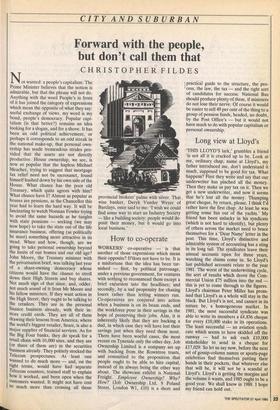Long view at Lloyd's
'THIS LLOYD'S lark,' grumbles a friend `is not all it is cracked up to be. Look at me, ordinary chap, name at Lloyd's, my father introduced me, don't understand it much, supposed to be good for tax. What happens? First they write and say that our underwriter has pinched all the money. Then they make us pay tax on it. Then we get a new underwriter, and now it seems that he's lost all the money. Thumping great cheque, by return, please. I think•I'd rather have the first chap. At least he was getting some fun out of the yachts.' My friend has been unlucky in his syndicate (which is not hard to identify), but plenty of others across the market need to brace themselves for a 'Dear Name' letter in the post. This time, Lloyd's distinctive and admirable system of accounting has a sting in its long tail. The syndicates leave their annual accounts open for three years, watching the claims come in. So Lloyd's last published accounts relate to the year 1981. The worst of the underwriting cycle, the sort of results which drove the Com- mercial Union £75 million into the red this is yet to come through to the figures. Lloyd's chairman Peter Miller has prom- ised that Lloyd's as a whole will stay in the black. But Lloyd's is not, and cannot in its nature be, a homogeneous market. In 1981, the most successful syndicate was able to write its members a £4,836 cheque for every £10,000 stake in its operations.
The least successful — an aviation syndi- cate which seems to have skidded off the runway — had to ask each £10,000 stakeholder to send in a cheque for £17,029. So let us say now, before the next set of gossip-column names or sports-page celebrities find themselves putting their hands in their pockets, that whatever else that will be, it will not be a scandal at Lloyd's. Lloyd's is getting the margins and the volume it wants, and 1985 ought to be a good year. We shall know in 1988. I hope my friend can hold out.


















































 Previous page
Previous page